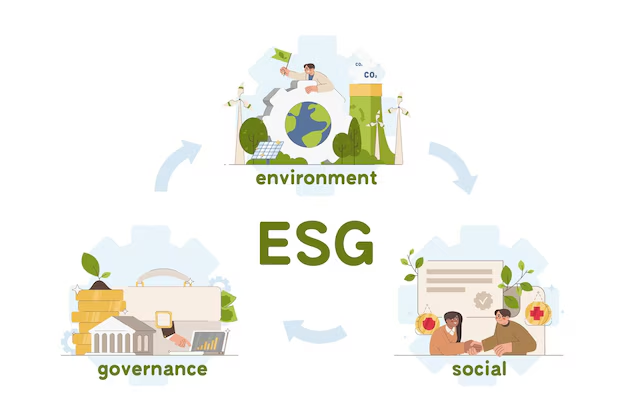
ESG Reporting: The Key to India’s Sustainable Future
In 2021, SEBI introduced the Business Responsibility and Sustainability Reporting (BRSR) framework, which aims to standardise ESG disclosures for the top 1,000 listed companies by market capitalisation, making reporting more consistent and comprehensive
In the last few decades, the framework of environmental governance has largely been about damage limitation, whether it is decreasing emissions, lowering pollution, or slowing the rate at which industry depletes non-renewable resources. But today, the world has realised that this isn’t enough. The urgency to save our ecosystems calls for a paradigm shift towards regeneration, renewal and the establishment of circular economies. Through the business lens, from environmental sustainability to social impact and transparent governance, ESG (Environmental, Social, and Governance) elements are no longer optional. Companies must now meet both investor expectations and regulatory demands to remain competitive.
Why ESG is crucial for India
While India’s growth story is turning heads on the global stage, it does place the country at a crossroads. On one hand, rapid economic growth brings opportunities, but on the other, it comes with environmental and social responsibilities. From carbon emissions to labour practices, companies are increasingly expected to adhere to standards that were previously seen as optional. But the good news is that India Inc. is definitely paying attention. A recent study where over 85 per cent of respondents were from companies with annual revenue of over $1 billion found that 65 per cent of Indian businesses are engaged in ESG reporting compared to 62 per cent in Singapore, 53 per cent in Hong Kong, and 41 per cent in China.
Beyond compliance, there is also a growing influence of conscious consumers and investors. An HBR study concluded that sustainability demands are on the rise, particularly with the younger generation that pays attention to business’s positive intent. This shift—which is more than just a trend—is evident in India too, where a younger, environmentally aware population is driving demand for ethical and sustainable brands.
The matrix of ESG reporting
One of the main challenges Indian companies face is the complexity of multiple reporting standards. From the Global Reporting Initiative (GRI) to federal and state governments ESG policies (2022 Energy Conservation Act, Carbon Credit Scheme, etc.), businesses are required to navigate an increasingly dense web of ESG frameworks. While these standards are critical in promoting transparency, their sheer number and varying methodologies often leave companies confused about which one to prioritise.
For Indian companies, especially those that operate across borders, the stakes are even higher. Many are expected to comply with both domestic regulations, such as BRSR by SEBI and international frameworks like the Sustainable Development Goals (SDGs). This dual obligation can lead to fragmented reporting and missed opportunities to present a cohesive ESG narrative to investors, regulators, and consumers.
How unified reporting can ease the burden
Unified ESG reporting combines multiple frameworks into a harmonised, single, streamlined process. Instead of grappling with varied reporting standards, businesses can implement a unified system that captures the essence of each framework, ensuring that they meet both local and global requirements. This approach not only simplifies the reporting process but also enhances transparency and comparability, which are crucial for building trust with stakeholders. By adopting unified reporting, Indian companies can present a cohesive and consistent ESG narrative, making it easier for investors, consumers, and regulators to understand their sustainability efforts. Moreover, unified reporting allows businesses to assess their performance against global benchmarks and align their practices with international sustainability goals, such as the Paris Agreement’s net zero targets. This can provide a competitive advantage, positioning Indian companies as leaders in the global sustainability movement.
Take, for instance, Indian firms in the energy sector. With global calls to phase out fossil fuels, these companies face increasing pressure to transition to renewable energy sources. Through unified reporting, they can communicate their shift towards greener energy to investors and stakeholders in a way that is both transparent and measurable. This builds confidence and positions them as leaders in the global transition to sustainability.
Tech can seal the deal
For unified ESG reporting to truly take hold in India, companies must embrace technology and innovation. Tools such as data analytics, artificial intelligence (AI), and blockchain are already revolutionising how businesses collect, manage, and report ESG data. These technologies can automate the reporting process, reducing human error and increasing the accuracy of disclosures. AI-driven platforms, for example, can analyse vast amounts of data to identify ESG trends, while blockchain can ensure the integrity of sustainability reports by providing an immutable record of corporate actions. By adopting such technologies, Indian companies can not only simplify ESG reporting but also future-proof their operations in a rapidly evolving regulatory landscape.
The way to a sustainable future
As the world shifts towards sustainability, Indian companies cannot afford to be left behind. The challenges posed by ESG are real and growing, but they also present significant opportunities for companies to innovate, enhance their reputations, and gain a competitive edge. Unified reporting offers a practical solution for navigating these challenges, allowing businesses to meet both local and global expectations while fostering greater transparency and accountability. By embracing this approach, Indian companies can not only keep pace with the evolving ESG landscape but also lead the charge towards a more sustainable future.
In the coming years, those that adopt unified reporting will be better positioned to meet the ambitious global goals set by frameworks like the Paris Agreement and the United Nations’ SDGs. The road ahead may be complex, but with the right tools and a commitment to sustainability, Indian businesses can contribute to a cleaner, more equitable world for generations to come.
Read more at:
Recent Posts

ESG Reporting: The Key to India’s Sustainable Future
January 2, 2025


Striking balance between growth and sustainability
October 22, 2022



